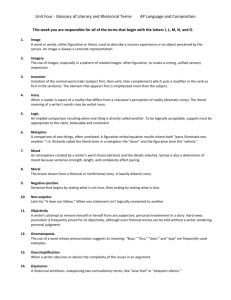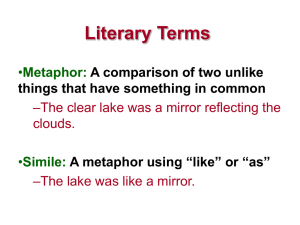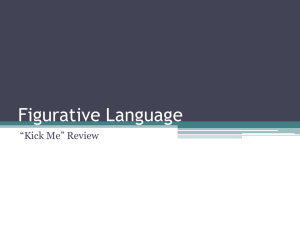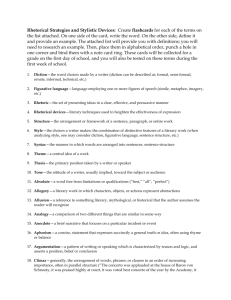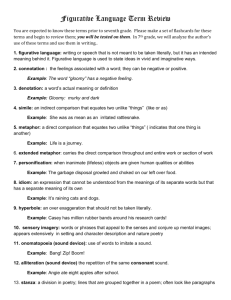1 Figurative Language - English
advertisement
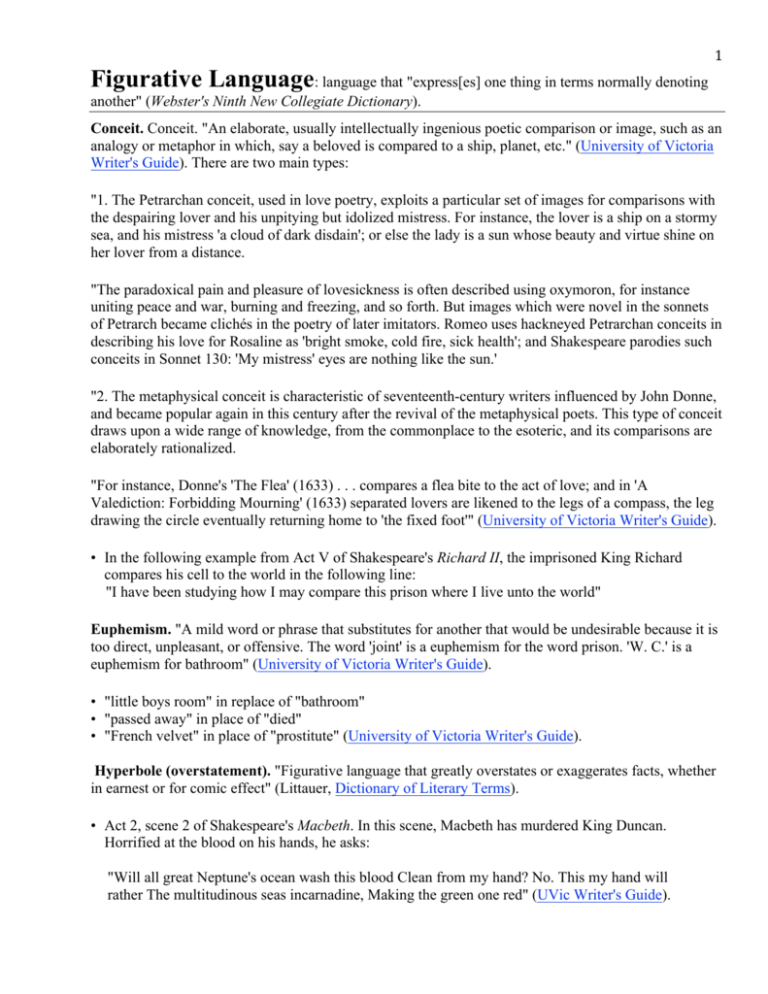
1 Figurative Language: language that "express[es] one thing in terms normally denoting another" (Webster's Ninth New Collegiate Dictionary). Conceit. Conceit. "An elaborate, usually intellectually ingenious poetic comparison or image, such as an analogy or metaphor in which, say a beloved is compared to a ship, planet, etc." (University of Victoria Writer's Guide). There are two main types: "1. The Petrarchan conceit, used in love poetry, exploits a particular set of images for comparisons with the despairing lover and his unpitying but idolized mistress. For instance, the lover is a ship on a stormy sea, and his mistress 'a cloud of dark disdain'; or else the lady is a sun whose beauty and virtue shine on her lover from a distance. "The paradoxical pain and pleasure of lovesickness is often described using oxymoron, for instance uniting peace and war, burning and freezing, and so forth. But images which were novel in the sonnets of Petrarch became clichés in the poetry of later imitators. Romeo uses hackneyed Petrarchan conceits in describing his love for Rosaline as 'bright smoke, cold fire, sick health'; and Shakespeare parodies such conceits in Sonnet 130: 'My mistress' eyes are nothing like the sun.' "2. The metaphysical conceit is characteristic of seventeenth-century writers influenced by John Donne, and became popular again in this century after the revival of the metaphysical poets. This type of conceit draws upon a wide range of knowledge, from the commonplace to the esoteric, and its comparisons are elaborately rationalized. "For instance, Donne's 'The Flea' (1633) . . . compares a flea bite to the act of love; and in 'A Valediction: Forbidding Mourning' (1633) separated lovers are likened to the legs of a compass, the leg drawing the circle eventually returning home to 'the fixed foot'" (University of Victoria Writer's Guide). • In the following example from Act V of Shakespeare's Richard II, the imprisoned King Richard compares his cell to the world in the following line: "I have been studying how I may compare this prison where I live unto the world" Euphemism. "A mild word or phrase that substitutes for another that would be undesirable because it is too direct, unpleasant, or offensive. The word 'joint' is a euphemism for the word prison. 'W. C.' is a euphemism for bathroom" (University of Victoria Writer's Guide). • "little boys room" in replace of "bathroom" • "passed away" in place of "died" • "French velvet" in place of "prostitute" (University of Victoria Writer's Guide). Hyperbole (overstatement). "Figurative language that greatly overstates or exaggerates facts, whether in earnest or for comic effect" (Littauer, Dictionary of Literary Terms). • Act 2, scene 2 of Shakespeare's Macbeth. In this scene, Macbeth has murdered King Duncan. Horrified at the blood on his hands, he asks: "Will all great Neptune's ocean wash this blood Clean from my hand? No. This my hand will rather The multitudinous seas incarnadine, Making the green one red" (UVic Writer's Guide). 2 • Andrew Marvell, "To His Coy Mistress": "My vegetable love should grow Vaster than empires, and more slow; An hundred years should go to praise Thine eyes and on thine forehead gaze; Two hundred to adore each breast, But thirty thousand to the rest." Litotes (understatement). "Understatement purposefully represents a thing as much less significant than it is, achieving an ironic effect" (University of Victoria Writer's Guide). • In Swift's "A Modest Proposal," which suggests eating children as a solution for Ireland's poverty, the speaker raises possible objections to dispense with them, saying, "some scrupulous People might be apt to censure such a Practice (although indeed very unjustly) as a little bordering upon Cruelty" (University of Victoria Writer's Guide). Metaphor. "In a metaphor, a word is identified with something different from what the word literally denotes. A metaphor is distinguished from a simile in that it equates different things without using connecting terms such as like or as. Whereas a simile states, 'My love is like a burning flame,' a metaphor refers to 'the burning flame of my love.' An extended metaphor explores a variety of ways in which a metaphor is appropriate to its subject (see conceit )" (University of Victoria Writer's Guide). • "There are the black clouds of God's wrath now hanging directly over your heads" (UVic Guide). • "the burning flame of my love" According to Perrine and Arp, there are four types of metaphors classified by whether the literal and figurative terms are stated or implied. 1. Both terms are stated: ◦ Her eyes are the blue sea flowing into the horizon. Both the literal image (eyes) and the figurative image (blue sea) are stated. 2. The literal term is stated and the figurative term implied: ◦ The man slithered through the woods. The literal image (man) is stated, but the figurative image (snake) is implied by the use of the word slither. 3. The literal term is implied and the figurative term is stated: ◦ "A Route of Evanescence With a revolving Wheel" --Emily Dickinson The literal terms (the hummingbird's path and wings) are implied but the figurative terms (route of evanescence, revolving wheel) are stated. 4. Both terms are implied: ◦ I like to see it lap the miles (Emily Dickinson). Both the literal term (a train) and the figurative term (a horse) are implied. Metonymy. "A figure of speech in which a word represents something else which it suggests" (University of Victoria Writer's Guide). • A person's says that a pot is boiling. The pot is not actually boiling. Only the water is boiling. 3 Oxymoron. "An oxymoron is a type of paradox that combines two terms ordinarily seen as opposites, such as Milton's description of God in Paradise Lost as 'Dark with excessive bright.' Simply put, oxymoron is the combination of words which, at first view, seem to be contradictory or incongruous, but whose surprising juxtaposition expresses a truth or dramatic effect, such as, cool fire, deafening silence, or wise folly" (University of Victoria Writer's Guide). Paradox. "A statement that contains seemingly contradictory elements or appears contrary to common sense, yet can be seen as perhaps, or indeed, true when viewed from another angle, such as Alexander Pope's statement in 'An Epistle to Dr. Arbuthnot' that a literary critic could 'damn with faint praise.'" (Glossary of Poetic Terms). Personification. "The attribution of human qualities to inanimate objects or abstract concepts" (University of Victoria Writer's Guide). • "Stormy, husky, brawling, City of the big shoulders" --Carl Sandburg • "Justice is blind." Simile. "A figure of speech which takes the form of a comparison between two unlike quantities for which a basis for comparison can be found, and which uses the words 'like' or 'as' in the comparison" (University of Victoria Writer's Guide). • "...as happy as the day is long" (University of Victoria Writer's Guide). • "He smelled like a donkey." Symbol. " Something that is itself and yet also represents something else, like an idea. For example, a sword may be a sword and also symbolize justice. A symbol may be said to embody an idea. There are two general types of symbols: universal symbols that embody universally recognizable meanings wherever used, such as light to symbolize knowledge, a skull to symbolize death, etc., and invested symbols that are given symbolic meaning by the way an author uses them in a literary work, as the white whale becomes a symbol of evil in Moby Dick [italics added]" (Harris, A Glossary of Literary Terms and A Handbook of Rhetorical Devices). Synecdoche. "A figure of speech wherein a part of something represents the whole thing. In this figure, the head of a cow might substitute for the whole cow. Therefore, a herd of fifty cows might be referred to as 'fifty head of cattle'" (Harris, A Glossary of Literary Terms and A Handbook of Rhetorical Devices). • "I should have been a pair of ragged claws Scuttling across the floors of silent seas." --T. S. Eliot, "The Love Song of J. Alfred Prufrock" • The U.S. won three gold medals. (Instead of the members of the U.S. boxing team won three gold medals.) (Harris, A Glossary of Literary Terms and A Handbook of Rhetorical Devices). Synesthesia. "One sensory experience described in terms of another sensory experience". Emily Dickinson, in "I Heard a Fly Buzz-When I Died," uses a color to describe a sound, the buzz of a fly "with blue, uncertain stumbling buzz." Authors of Figurative Language page: Spry Baltz, Bart Critser, Jay Adams (and The Buffalo), and Will Boynton (Baylor School)
